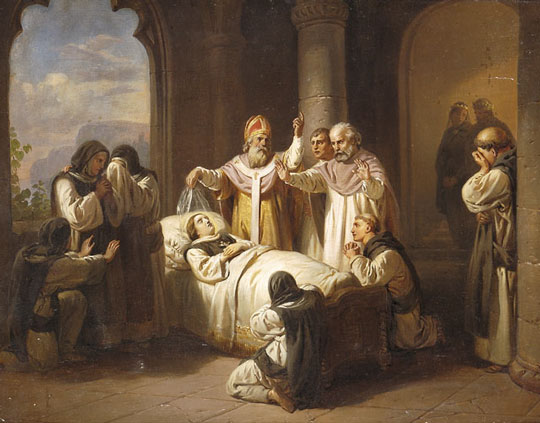Tuesday of week 2 in Ordinary Time  St. Margaret of Hungary Stained glass window from St. Dominic’s Church in Washington, D.C. Readings at MassLiturgical Colour: Green.
Jesse's youngest son David is anointed kingThe Lord said to Samuel, ‘How long will you go on mourning over Saul when I have rejected him as king of Israel? Fill your horn with oil and go. I am sending you to Jesse of Bethlehem, for I have chosen myself a king among his sons.’ Samuel replied, ‘How can I go? When Saul hears of it he will kill me.’ Then the Lord said, ‘Take a heifer with you and say, “I have come to sacrifice to the Lord.” Invite Jesse to the sacrifice, and then I myself will tell you what you must do; you must anoint to me the one I point out to you.’ Samuel did what the Lord ordered and went to Bethlehem. The elders of the town came trembling to meet him and asked, ‘Seer, have you come with good intentions towards us?’ ‘Yes,’ he replied ‘I have come to sacrifice to the Lord. Purify yourselves and come with me to the sacrifice.’ He purified Jesse and his sons and invited them to the sacrifice. When they arrived, he caught sight of Eliab and thought, ‘Surely the Lord’s anointed one stands there before him’, but the Lord said to Samuel, ‘Take no notice of his appearance or his height for I have rejected him; God does not see as man sees; man looks at appearances but the Lord looks at the heart.’ Jesse then called Abinadab and presented him to Samuel, who said, ‘The Lord has not chosen this one either.’ Jesse then presented Shammah, but Samuel said, ‘The Lord has not chosen this one either.’ Jesse presented his seven sons to Samuel, but Samuel said to Jesse, ‘The Lord has not chosen these.’ He then asked Jesse, ‘Are these all the sons you have?’ He answered, ‘There is still one left, the youngest; he is out looking after the sheep.’ Then Samuel said to Jesse, ‘Send for him; we will not sit down to eat until he comes.’ Jesse had him sent for, a boy of fresh complexion, with fine eyes and pleasant bearing. The Lord said, ‘Come, anoint him, for this is the one.’ At this, Samuel took the horn of oil and anointed him where he stood with his brothers; and the spirit of the Lord seized on David and stayed with him from that day on. As for Samuel, he rose and went to Ramah.
I have found David, my servant. Of old you spoke in a vision. To your friends the prophets you said: ‘I have set the crown on a warrior, I have exalted one chosen from the people. I have found David, my servant. ‘I have found David my servant and with my holy oil anointed him. My hand shall always be with him and my arm shall make him strong. I have found David, my servant. ‘He will say to me: “You are my father, my God, the rock who saves me.” And I will make him my first-born, the highest of the kings of the earth.’ I have found David, my servant.
Alleluia, alleluia! Open my eyes, O Lord, that I may consider the wonders of your law. Alleluia!
Alleluia, alleluia! May the Father of our Lord Jesus Christ enlighten the eyes of our mind, so that we can see what hope his call holds for us. Alleluia!
The sabbath was made for man, not man for the sabbathOne sabbath day, Jesus happened to be taking a walk through the cornfields, and his disciples began to pick ears of corn as they went along. And the Pharisees said to him, ‘Look, why are they doing something on the sabbath day that is forbidden?’ And he replied, ‘Did you never read what David did in his time of need when he and his followers were hungry – how he went into the house of God when Abiathar was high priest, and ate the loaves of offering which only the priests are allowed to eat, and how he also gave some to the men with him?’ And he said to them, ‘The sabbath was made for man, not man for the sabbath; the Son of Man is master even of the sabbath.’ The readings on this page are from the Jerusalem Bible, which is used at Mass in most of the English-speaking world. The New American Bible readings, which are used at Mass in the United States, are available in the Universalis apps, programs and downloads. |


